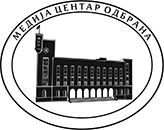12.01.2016
Collection "Serbia and the geopolitical situation in Europe in 1914" presented
 In the Central Military Club, today, the anthology "Serbia and the geopolitical situation in Europe in 1914", co-published by the Belgrade Institute of Political Studies and the City Library Lajkovac.
In the Central Military Club, today, the anthology "Serbia and the geopolitical situation in Europe in 1914", co-published by the Belgrade Institute of Political Studies and the City Library Lajkovac.The book, which includes 12 papers from the Symposium, held just over a year in Lajkovac, organized by the local Cultural Centre Haji Reuben, spoke Milomir Stepic, Research Adviser at the Institute of Political Studies, Ljubodrag Ristic, senior research associate of the Institute for Balkan Studies SASA, Mira Radojevic, associate professor at the Faculty of Philosophy, Department of History, Mile Bjelajac, Director of the Institute of Modern History of Serbia and Zivojin Djuric, Director of the Institute of Political Studies.
Stepic said that the ambitions of Austria-Hungary and Germany, on whose path Serbia stood, led to the First World War, and that the current attempts at revision of historical facts from that time are motivated by the interests of those who want to take the device and turn it into - the cause of war, for which Serbia would thus be blamed. Ljubodrag Ristic, senior research associate of the Institute for Balkan Studies SASA, editor of the collection, presented its contents and the basic thesis of the author of the paper, historians and political scientists.
Associate Professor at the Faculty of Philosophy Mira Radojevic, answering the question of what new things the collection brings, said that, in addition to access and content, it was a kind of originality and multidisciplinarity and said that behind the book "Serbia and the geopolitical situation in Europe in 1914" remain a lot of new knowledge and a message that should not be forgotten.

Mile Bjelajac, Director of the Institute of Modern History of Serbia said that the book, compared to similar published almanacs, is distinguished by it putting us in the present, and it opens the issues of the future, and that in 1914 the factors of deterrence and good judgment "failed", and that in the first thing Britain and Russia failed, and Austria-Hungary in the other, which inadequately assessed the Serbian defence capacity. Talking about the attempts at revision, he pointed out that when it comes to motives, other than the imputation of nationalism, we should reflect on the evident attempt to repudiate any idea of resistance of small states.
Concluding the presentation of the book, Zivojin Djuric, Director of the Institute of Political Studies expressed the view that the collection is not just of scientific - research significance, but also of cultural and spiritual value.

